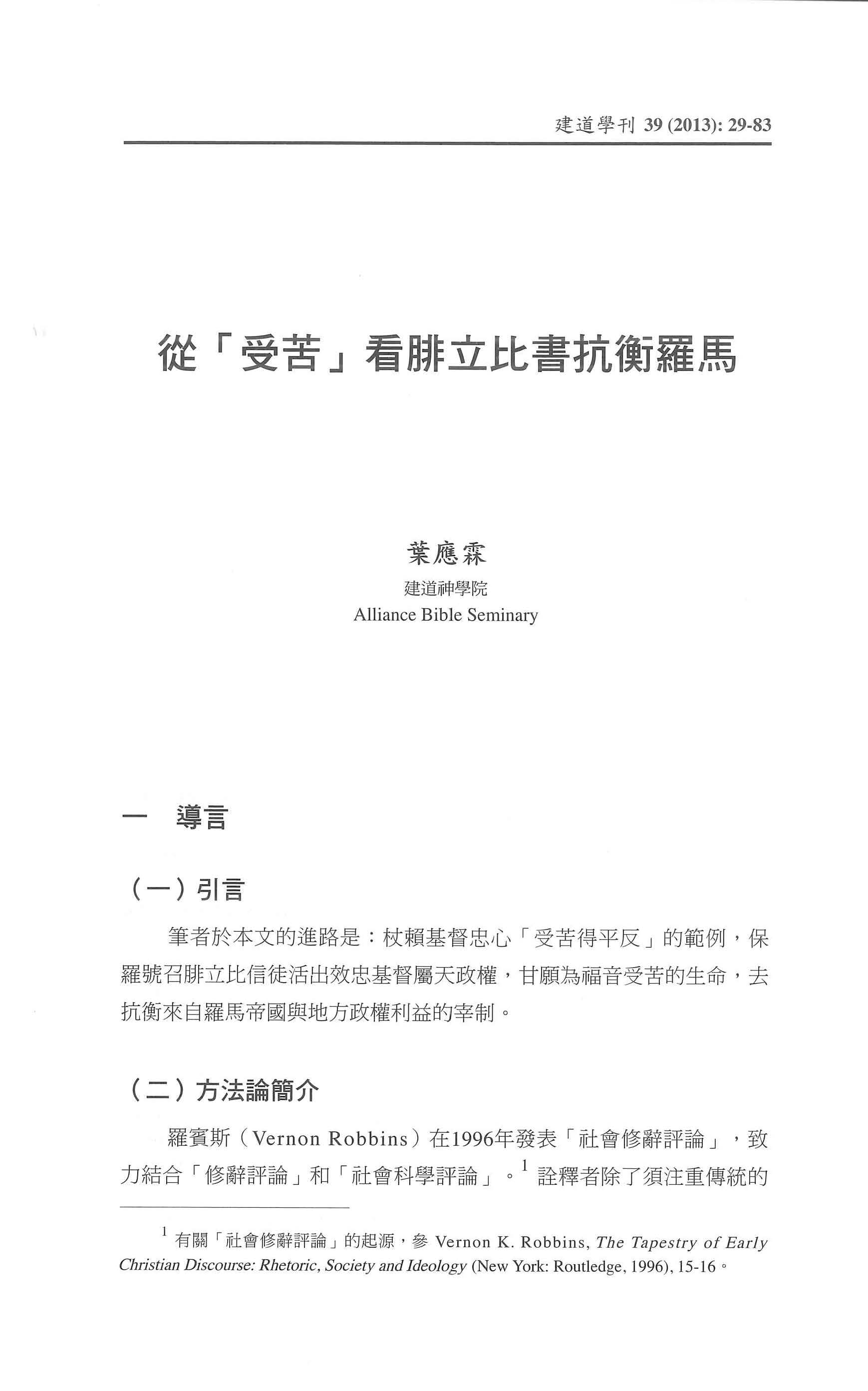從「受苦」看腓立比書抗衡羅馬/葉應霖
撮要
腓立比書是一封以「政治上的對抗」為題目的書信。藉賴「社會修辭評論」,筆者將驗證腓立比教會各類敵人的身份,並展示保羅的修辭策略,是如何透過建立另類的πολι´τευμα(政治實體),刻意對比以耶穌基督及羅馬帝王為首的兩個羣體,並以「受苦得平反」的神學思想,去詮釋教會的受苦遭遇。基督耶穌的見證,就是這新興宗教羣體的「內羣原型」(in-group prototype)。但凡願意跟隨主「受苦得平反」的神學秩序,並與保羅、提摩太及以巴弗提一起加入這「受苦團契」,就配得在這羣體「社會身份」(Social Identity)的界線之內,並能更深認識基督,領受神的賜福。以下四方面是腓立比書四個抗衡羅馬帝國的信息:隨意處置人命的終極權力、生命意義的陳述權、帝國政權的權威及宇宙觀及公民效忠的優先性。留意,這抗衡這不包括鼓勵信徒推翻羅馬帝國,建立地上另類的帝國。
ABSTRACT
The Epistle to the Philippians is a letter with a topos of “Political Confront.” Through “socio-rhetorical criticism,” I will verify the historical identities of the enemies inside the epistle, and show the rhetorical strategy of Paul in building a πολι´τευμα (political entity) of a different kind, to deliberately compare the groups headed by Jesus Christ and Roman emperors, and interpret the suffering through the theology of “suffering and vindication.” The testimony of Christ Jesus has become the “in-group prototype” of this new religious group. Anyone who is willing to endorse and follow this “suffering and vindication” theological order, and join the suffering κοινωνιά of Paul, Timothy and Epaphroditus will be worthy of staying inside the boundary of this social identity, know Christ deeper and receive the blessing from God. The anti-Rome message contains four aspects: the ultimate power in handling physical lives of people; the adjudicating of the meaning of lives; the ultimate authority and cosmology of the Roman empire; and the allegiance priority. However, the earthly overthrow of the Empire, as proposed by some, is not included.
原載於《建道學刊》39期(2013年1月),頁29-83。
作者簡介
葉應霖
聖經系助理教授
學生事務長
Latest Articles
新手牧者研究計劃(三):新手牧者的身心靈狀態 / 盧慧儀
2025 年 11 月 19 日
個體與關係:滕近輝思想中「深化」的靈性觀 / 倪步曉
2025 年 11 月 18 日
香港九龍塘基督教中華宣道會之起源和發展史/陳智衡
2025 年 10 月 20 日
Highlights
[電子書]困境與抉擇:「建道研究中心30週年誌慶」跨學科研討會論文集/廖炳堂、倪步曉主編
2025 年 1 月 2 日
從梧州到長洲:建道神學院125年的挑戰與恩典 / 陳智衡
2023 年 10 月 1 日
微小教會的見證/高銘謙
2023 年 6 月 1 日








